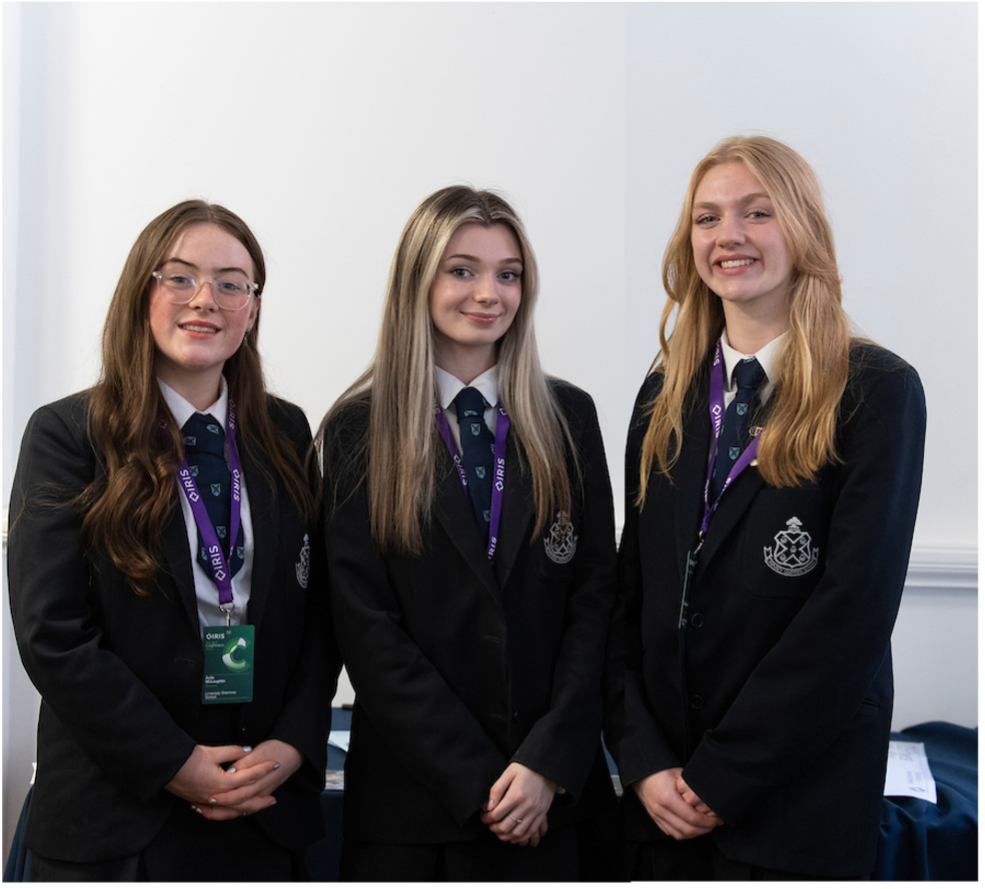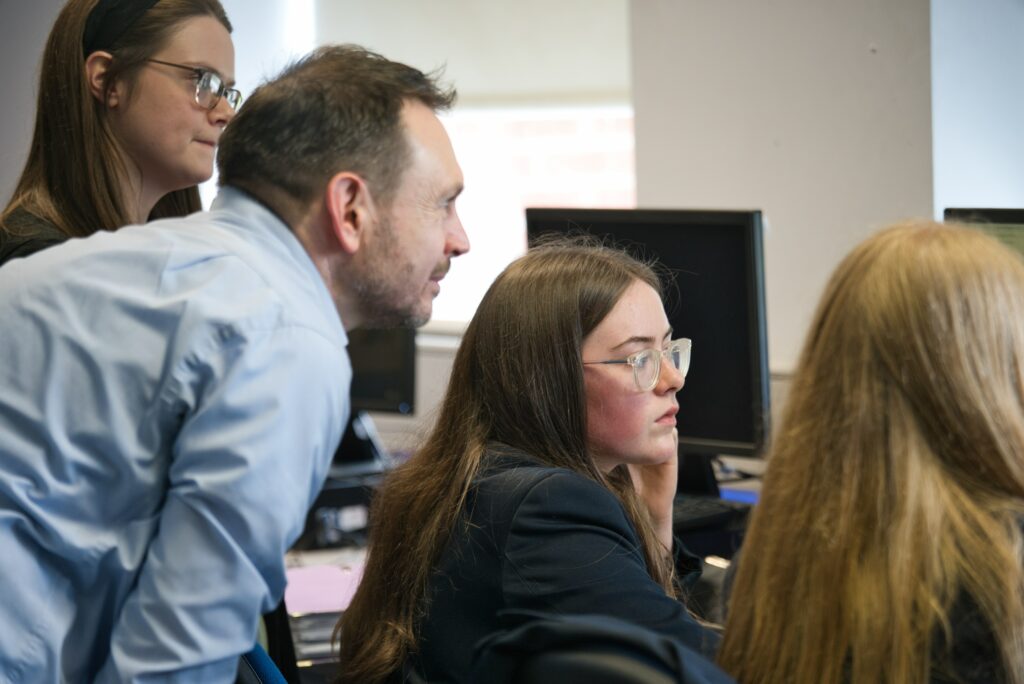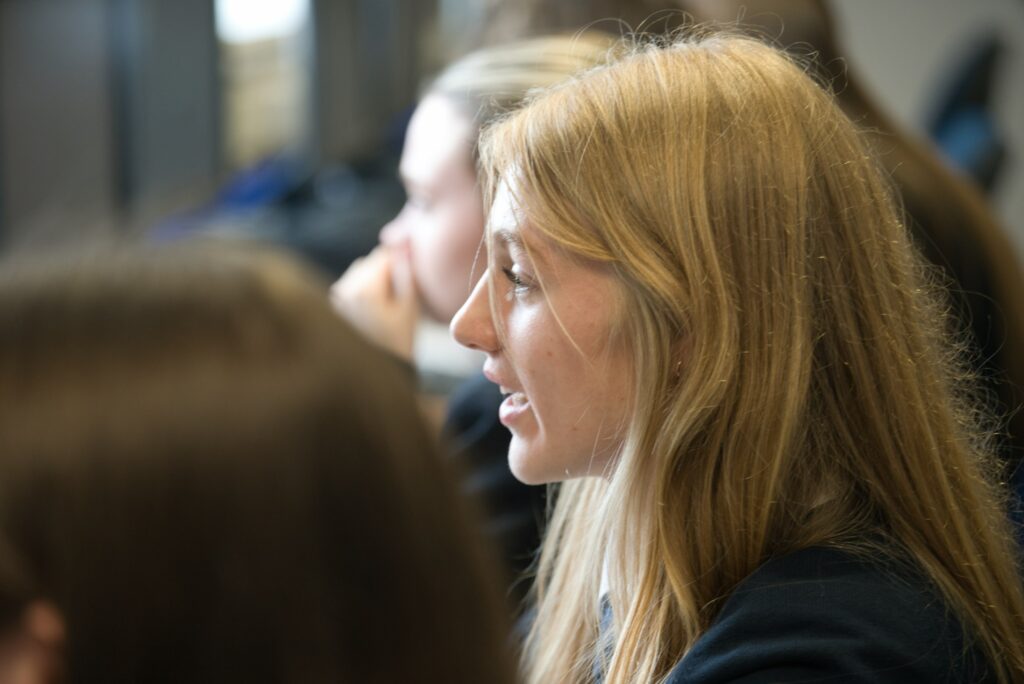
Aoife, Ella & Darcy
Limavady Grammar School
Limavady students shared how their research experience on the Big Data: ATLAS project shaped them personally, beyond what they had imagined.
While women are significantly underrepresented in the UK physics workforce, a group of schoolgirls in Northern Ireland prove that doesn’t have to be the case.
“I have a great passion for physics, but always questioned doing it at university, whether I’d be capable.” said Aoife, a student at Limavady Grammar School in County Londonderry.
 Alan Barr and Aoife pictured at the Limavady particle physics masterclass
Alan Barr and Aoife pictured at the Limavady particle physics masterclassAoife was one of 275 students, including 96 girls, who took part in Big Data: ATLAS.
The research project was developed by IRIS in collaboration with the University of Oxford and Rutherford Appleton Laboratory to introduce young people to the joy of particle physics. As part of the project, students learn techniques used by particle physicists to analyse data resulting from proton-proton collisions in the Large Hadron Collider at CERN. With their newfound skills, they then try to find evidence of the Higgs boson.
This experience not only taught Aoife new skills in computer programming, but it strengthened her confidence in her ability to understand physics. It also opened a window into a future study of the subject.
“Before, I didn’t know what it could involve. It was fun to gain an insight into programming you could use for physics, including the different, more advanced physics. After doing the project I think I’d really enjoy a physics degree” explains Aoife.
“I’m amazed at what students got through in what is really a difficult project, in terms of the new physics they’ve been learning and the computer coding they’ve had to pick up. They’ve been able to address really difficult questions in physics from their own classroom. That’s extraordinary”
Other Limavady Grammar students that were part of the research project were equally impacted by the experience.
“You get to know the types of things you could do with physics and decide if it’s for you,” said Ella. W Students share how their research experience shaped them personally, beyond what they had imagined.
For someone who didn’t study physics at this level before, Ella picked it up quickly. Taking part in the project built her confidence and sparked her passion for the subject.
“It’s mind-blowing, to even think that this is real stuff that’s going on that you’re analysing. Sometimes you need to just take a minute and remember that – it’s really cool,” said Ella.
 Darcy working on the programming code with classmates at Limavady
Darcy working on the programming code with classmates at LimavadyIt was not an easy road for the students; finding evidence of the Higgs boson is challenging.
“I didn’t do computer science for GCSE so I have been thrown in at the deep end, but I really enjoy it,” commented Darcy.
“Learning the code was tricky, it had to be so perfect, but doing it as a group made it easier because we could work together. Seeing the error at the end was always heartbreaking. But the more we did it, the more we got invested in it,” said Darcy.
“It’s interesting to do work outside your curriculum to understand that science isn’t just learning definitions and doing methods, but that it’s research, finding out things for yourself”
Prof Alan Barr, Professor of Particle Physics at the University of Oxford visited Limavady earlier this year to provide a masterclass, which included coding lessons.
“I’m amazed at what students got through in what is really a difficult project, in terms of the new physics they’ve been learning and the computer coding they’ve had to pick up. They’ve been able to address really difficult questions in physics from their own classroom. That’s extraordinary,” said Alan.
Would the girls recommend an IRIS project to their friends?
“Definitely do any research project like this, whether it’s physics or biology or chemistry. It’s interesting to do work outside your curriculum to understand that science isn’t just learning definitions and doing methods, but that it’s research, finding out things for yourself, trial and error. There’s no right answer,” says Ella.
